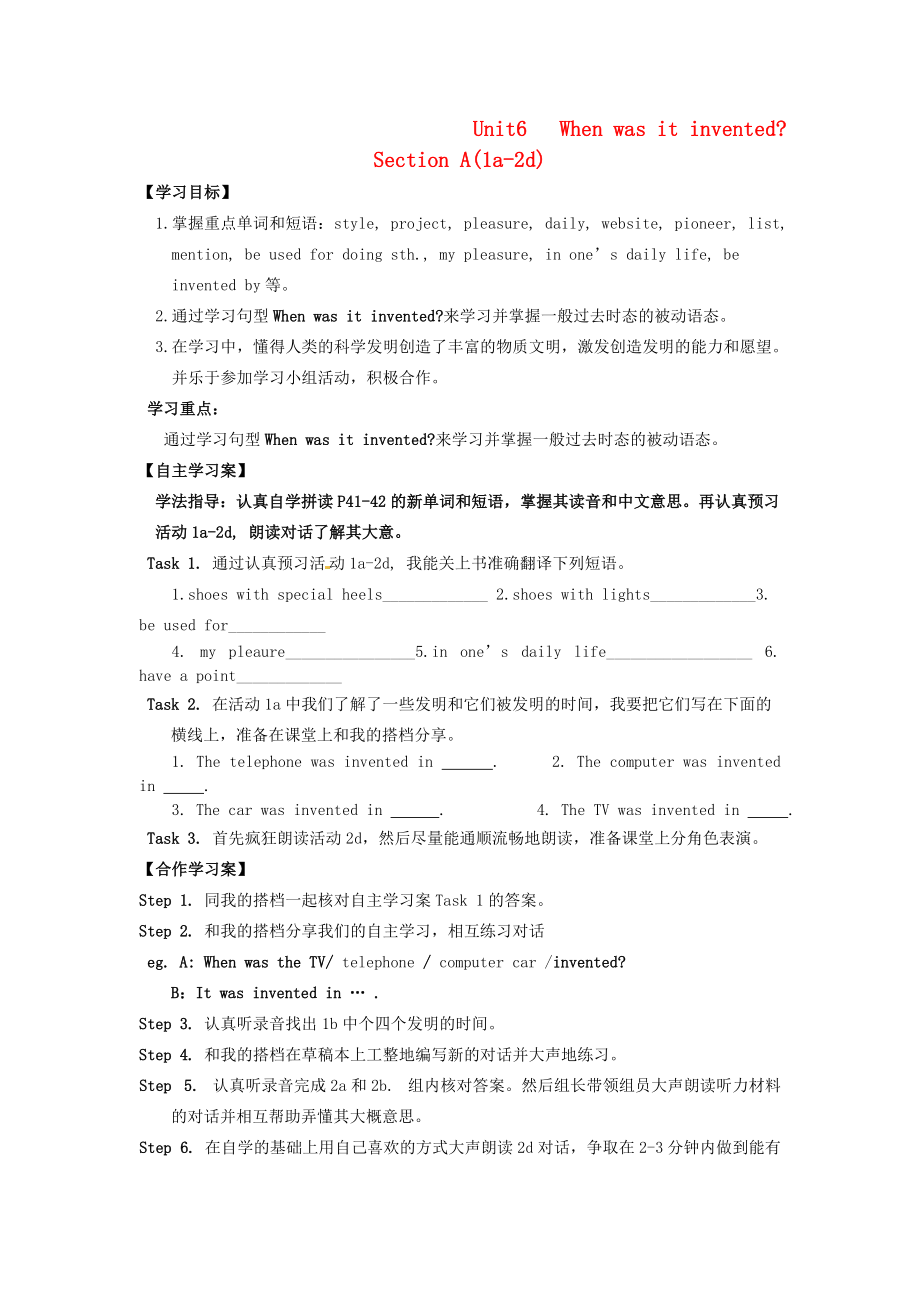《山西省運(yùn)城市垣曲縣九年級(jí)英語(yǔ)全冊(cè) Unit 6 When was it invented Section A1a2d學(xué)案無(wú)答案新版人教新目標(biāo)版》由會(huì)員分享��,可在線閱讀��,更多相關(guān)《山西省運(yùn)城市垣曲縣九年級(jí)英語(yǔ)全冊(cè) Unit 6 When was it invented Section A1a2d學(xué)案無(wú)答案新版人教新目標(biāo)版(3頁(yè)珍藏版)》請(qǐng)?jiān)谘b配圖網(wǎng)上搜索�����。
1、
Unit6 When was it invented? Section A(1a-2d)
【學(xué)習(xí)目標(biāo)】
1.掌握重點(diǎn)單詞和短語(yǔ):style, project, pleasure, daily, website, pioneer, list, mention, be used for doing sth., my pleasure, in one’s daily life, be invented by等���。
2.通過(guò)學(xué)習(xí)句型When was it invented?來(lái)學(xué)習(xí)并掌握一般過(guò)去時(shí)態(tài)的被動(dòng)語(yǔ)態(tài)����。
3.在學(xué)習(xí)中����,懂得人類的科學(xué)發(fā)明創(chuàng)造了豐富的物質(zhì)文明���,激發(fā)創(chuàng)造發(fā)明
2�、的能力和愿望���。并樂(lè)于參加學(xué)習(xí)小組活動(dòng)��,積極合作��。
學(xué)習(xí)重點(diǎn):
通過(guò)學(xué)習(xí)句型When was it invented?來(lái)學(xué)習(xí)并掌握一般過(guò)去時(shí)態(tài)的被動(dòng)語(yǔ)態(tài)�。
【自主學(xué)習(xí)案】
學(xué)法指導(dǎo):認(rèn)真自學(xué)拼讀P41-42的新單詞和短語(yǔ)���,掌握其讀音和中文意思�。再認(rèn)真預(yù)習(xí)活動(dòng)1a-2d, 朗讀對(duì)話了解其大意。
Task 1. 通過(guò)認(rèn)真預(yù)習(xí)活動(dòng)1a-2d, 我能關(guān)上書(shū)準(zhǔn)確翻譯下列短語(yǔ)���。
1. shoes with special heels_____________ 2.shoes with lights_____________3. be used for____________
4. my p
3���、leaure________________5.in one’s daily life__________________ 6. have a point_____________
Task 2. 在活動(dòng)1a中我們了解了一些發(fā)明和它們被發(fā)明的時(shí)間,我要把它們寫在下面的橫線上�����,準(zhǔn)備在課堂上和我的搭檔分享��。
1. The telephone was invented in . 2. The computer was invented in .
3. The car was invented in . 4. The TV was
4�、invented in .
Task 3. 首先瘋狂朗讀活動(dòng)2d,然后盡量能通順流暢地朗讀��,準(zhǔn)備課堂上分角色表演�����。
【合作學(xué)習(xí)案】
Step 1. 同我的搭檔一起核對(duì)自主學(xué)習(xí)案Task 1的答案���。
Step 2. 和我的搭檔分享我們的自主學(xué)習(xí)�����,相互練習(xí)對(duì)話
eg. A: When was the TV/ telephone / computer car /invented?
B:It was invented in … .
Step 3. 認(rèn)真聽(tīng)錄音找出1b中個(gè)四個(gè)發(fā)明的時(shí)間��。
Step 4. 和我的搭檔在草稿本上工整地編寫新的對(duì)話并大聲地練習(xí)�����。
Step 5.
5����、認(rèn)真聽(tīng)錄音完成2a和2b. 組內(nèi)核對(duì)答案。然后組長(zhǎng)帶領(lǐng)組員大聲朗讀聽(tīng)力材料的對(duì)話并相互幫助弄懂其大概意思��。
Step 6. 在自學(xué)的基礎(chǔ)上用自己喜歡的方式大聲朗讀2d對(duì)話����,爭(zhēng)取在2-3分鐘內(nèi)做到能有感情的背誦對(duì)話�。然后小組合作弄懂對(duì)話的大概意思,勾出重點(diǎn)�,做好隨堂筆記。完成后由組長(zhǎng)根據(jù)行展示���。
Step 7. 知識(shí)梳理��。
1.invent (v.)發(fā)明���;創(chuàng)造
invent 指發(fā)明創(chuàng)造出自然界本來(lái)不存在的東西���,如工具、方法�����、手段��、汽車�、電器、合成材料等�����。
eg. Bell invented the telephone. 貝爾發(fā)明了電話�。
2.be used for 用來(lái)做…… 此短
6、語(yǔ)中的for是介詞�,表示用途,后接名詞或動(dòng)詞-ing形式���。
eg. An orange is used for medicine. 桔子可以入藥����。
A pen is used for writing. 鋼筆用來(lái)寫字。
【橫向輻射】discover, find, create
1.discover是“發(fā)現(xiàn)”的意思�,是指發(fā)現(xiàn)原來(lái)就有而一直沒(méi)被發(fā)現(xiàn),如發(fā)現(xiàn)電�、煤、石油等礦藏及新星���、星系或科學(xué)真理等���。
eg. Columbus discovered America in 1492.1492年哥倫布發(fā)現(xiàn)了新大陸。
2.find的意思是“尋找”���,強(qiáng)調(diào)找的結(jié)果�,并不指發(fā)現(xiàn)�����。
eg. Ive t
7���、ried to find another copy but couldnt find one.我試圖再找一本,但沒(méi)能弄到�����。
3.create指有目的地把原材料制成新產(chǎn)品,也指創(chuàng)造出原來(lái)不存在的或與眾不同的事物����。
eg. Man creates himself. 人類創(chuàng)造了自己。
【橫向輻射】be used as & be used by
1.be used as 意為“被用作……”����,介詞as表示“作為”,其后一般接名詞�����,強(qiáng)調(diào)使用的工具及手段���。
eg. English is used as the second language in many countries. 英語(yǔ)在許多國(guó)家
8�����、被當(dāng)作第二語(yǔ)言使用��。
2.be used by 意為“被……使用”�,介詞by后面接動(dòng)作的執(zhí)行者(賓語(yǔ))����。
eg.English is used by travelers and business people all over the world. 全世界的旅行者和商人們使用英語(yǔ)����。
【鞏固訓(xùn)練案】
I.按要求完成下列句子����。
(1)Cars were invented in 1885.(對(duì)劃線部分提問(wèn))
cars invented?
(2 ) Julie Thompson invented electric slippers.(改為被動(dòng)語(yǔ)態(tài))
9、 Electric slippers Julie Thompson.
(3) The shoes with lights are used for seeing in the dark.( 對(duì)劃線部分提問(wèn))
are the shoes with lights ?
(4) The light bulb(燈泡) was invented by Thomas Edison. (對(duì)劃線部分提問(wèn))
the light bulb invented by?
(5)Th
10�、e refrigerator is used to keep food fresh.(改為同義句)
The refrigerator is used food fresh.
II. 根據(jù)漢語(yǔ)意思完成句子。(一空一詞)
1. 電腦是這樣偉大的發(fā)明����,以致極大地改變了世界。
Computer is a great that it has changed the world a lot.
2. 想想電腦在我們?nèi)粘I钪杏玫枚嗝搭l繁���。
Think about how the computer is
11��、 our lives.
3. 你可以列出你的工作項(xiàng)目��。You can your work .
4. –你能幫我看看那鞋子的款式嗎? --沒(méi)問(wèn)題��。
-- Can you help me look at the of the shoes?
-- .
5. 沒(méi)有提到那是被誰(shuí)發(fā)明的��。
It doesn’t who it .
【總結(jié)反思】
這節(jié)課我學(xué)到的新知識(shí)有:___________________ ___________________________________
這節(jié)課我的不足之處是:
6EDBC3191F2351DD815FF33D4435F3756EDBC3191F2351DD815FF33D4435F3756EDBC3191F2351DD815FF33D4435F3756EDBC3191F2351DD815FF33D4435F3756EDBC3191F2351DD815FF33D4435F3756EDBC3191F2351DD815FF33D4435F375
 山西省運(yùn)城市垣曲縣九年級(jí)英語(yǔ)全冊(cè) Unit 6 When was it invented Section A1a2d學(xué)案無(wú)答案新版人教新目標(biāo)版
山西省運(yùn)城市垣曲縣九年級(jí)英語(yǔ)全冊(cè) Unit 6 When was it invented Section A1a2d學(xué)案無(wú)答案新版人教新目標(biāo)版

